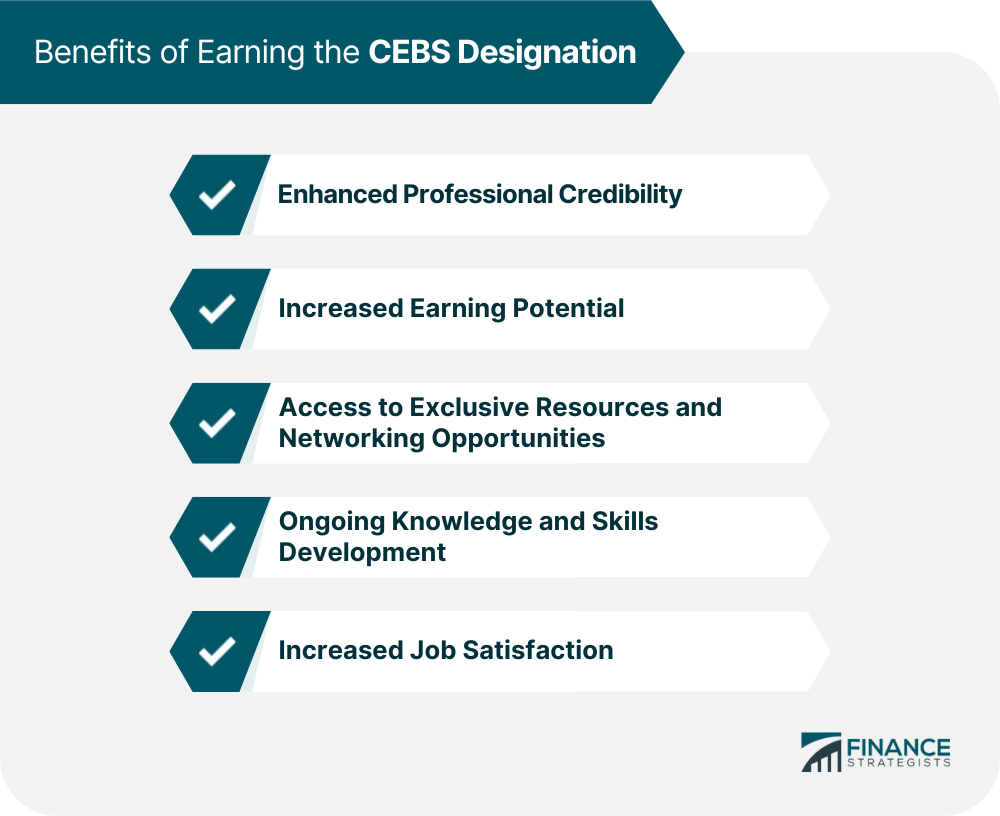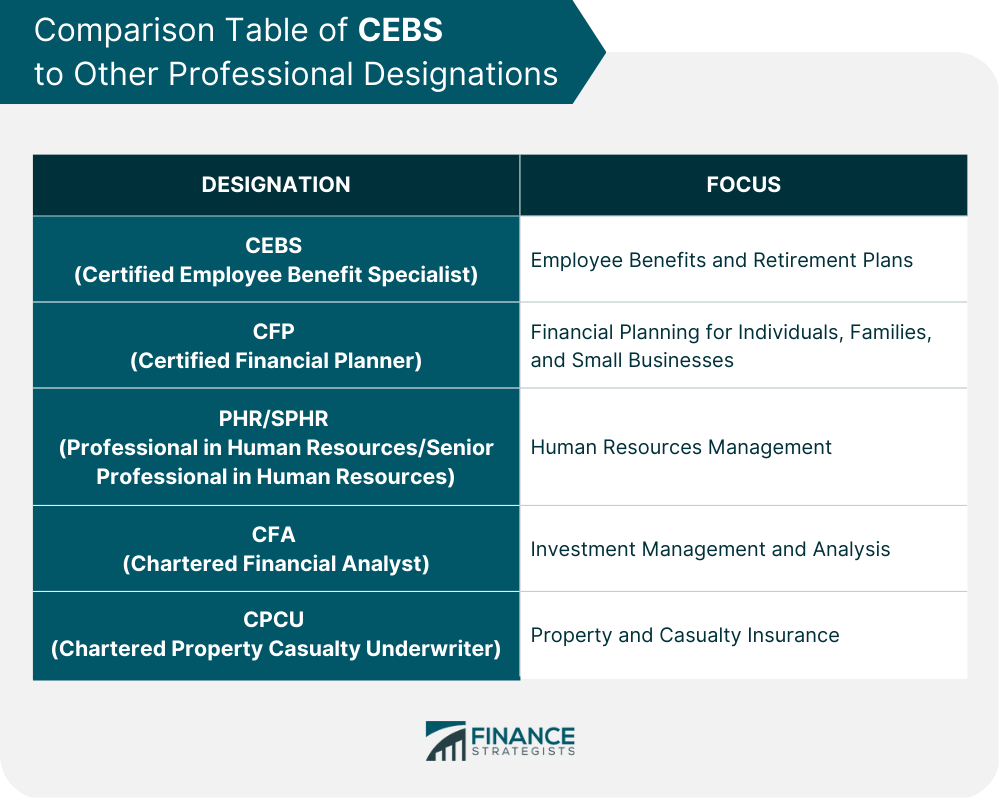The Certified Employee Benefit Specialist (CEBS) is a professional designation that validates expertise in administering employee benefits packages. This certification is awarded by the International Foundation of Employee Benefit Plans, and its curricula are designed by the Wharton School of the University of Pennsylvania and Dalhousie University in Canada. It mainly focuses on two areas: group health and welfare benefits, and retirement benefits packages. The CEBS certification program requires candidates to complete five core courses, which are a combination of the Group Benefits Associate (GBA) and Retirement Plans Associate (RPA) designations. The GBA is intended for those who will be managing group health and welfare benefits, while the RPA is for professionals working with defined-benefit and defined-contribution plans. After finishing each course, candidates must take a 100-question exam. The CEBS program generally takes about three years to complete. CEBS candidates can choose to study independently, take online classes, or attend in-person classes, with study materials available in print and digital formats. As regulations differ between the United States and Canada, students from these countries will encounter varying course material. For instance, U.S. students will study the Affordable Care Act (ACA), while Canadian students will learn about their country's system of universal healthcare coverage. The CEBS (Certified Employee Benefit Specialist) designation requires the successful completion of five required course exams. These include – three Group Benefits Associate (GBA) courses, two Retirement Plans Associate (RPA) courses, and one Strategic Benefits Management (SBM) course. The recommended starting point for CEBS candidates is GBA 1 or RPA 1, depending on their area of interest. The required courses are: GBA 1 Directing Benefits Programs Part 1. This course covers the basics of group benefits, including group health, dental, life, disability, and other benefits. It also covers the legal and regulatory environment for group benefits and the various funding and plan designs. GBA 2 Directing Benefits Programs Part 2. This course builds on the concepts learned in GBA 1 and covers more advanced topics in group benefits, including self-funded plans, health care cost management, and integrated disability management. GBA/RPA 3 Strategic Benefits Management. This course covers the strategic aspects of employee benefits, including aligning benefits programs with organizational objectives, designing and implementing effective communication strategies, and evaluating benefits programs. RPA 1 Directing Retirement Plans Part 1. This course covers the basics of retirement plans, including defined benefit and defined contribution plans and the regulatory environment governing these plans. RPA 2 Directing Retirement Plans Part 2. This course builds on the concepts learned in RPA 1 and covers more advanced topics in retirement plans, including plan design, administration, and compliance. Preparing for each CEBS exam requires a structured approach that includes studying the course materials, practicing with sample questions, and seeking additional support as needed. Here are some steps you can take to prepare for each exam: Schedule The Exam. After completing the course, schedule the exam as soon as possible to ensure that the course content is still fresh in your mind. Order Study Materials. Order the study guide and textbook assigned to each course, and review the materials thoroughly. Make sure to take notes and highlight important concepts as you read. Practice with Sample Questions. The CEBS program provides sample questions and practice exams for each course, which you can use to test your knowledge and identify areas where you need to focus your study efforts. Consider Online Study Groups. Online study groups provide a structured learning environment, access to instructors, and peer interaction. Consider joining an online study group to get additional support and guidance as you prepare for each exam. Use Other Resources. Additional resources are available to help you prepare for each exam, including study guides, flashcards, and online courses. Take advantage of these resources to supplement your learning and reinforce important concepts. By following these steps, you can ensure that you are well-prepared for each CEBS exam and on your way to earning your designation. Maintaining CEBS certification is an ongoing process that requires CEBS holders to complete 30 hours of continuing education every two years. These hours can be earned through a variety of activities, including attending conferences, taking courses, writing articles, and participating in webinars. CEBS holders can access various educational resources through the International Foundation of Employee Benefit Plans, which administers the CEBS program. These resources include online courses, webcasts, conferences, publications, and research reports. They can also earn credit hours by attending and participating in local chapter events, which provide networking and professional development opportunities. Additionally, they can earn credit hours by volunteering for the International Foundation's committees and task forces, which offer opportunities to contribute to the field of employee benefits and retirement plans. By staying up-to-date with the latest developments and trends in employee benefits, retirement plans, and compensation, CEBS holders can maintain their professional Earning the CEBS designation can bring many benefits to professionals working in the employee benefits industry. CEBS certification is a reliable indicator of advanced knowledge and expertise in the employee benefits industry. It demonstrates to employers and clients that the holder has met rigorous education and experience requirements and has passed a series of challenging exams. This can enhance the professional credibility of the holder and lead to more opportunities for career advancement. CEBS certification can also lead to increased earning potential. Many employers are willing to pay more to professionals with advanced credentials, such as CEBS, as they bring additional value and expertise to the organization. This can result in higher salaries, bonuses, and other compensation benefits. CEBS-certified professionals have access to exclusive resources and networking opportunities through the International Foundation of Employee Benefit Plans (IFEBP) and the CEBS Alumni Association. The IFEBP is the leading source of education and information for employee benefits professionals and offers a variety of events, seminars, and publications. The CEBS Alumni Association provides a platform for networking, mentorship, and professional development, which can help CEBS holders to stay current with industry trends and best practices. The knowledge and skills gained through the CEBS program can benefit professionals throughout their careers, making them more effective in their work and allowing them to provide better service to their clients or employer. CEBS holders are required to complete continuing education courses to maintain their certification, which ensures that they stay up-to-date with the latest industry developments. By gaining advanced knowledge and expertise in the employee benefits industry, CEBS holders can become more confident and effective in their work, which can lead to increased job satisfaction. Additionally, the CEBS certification can open up new career opportunities and lead to more fulfilling and rewarding work in the employee benefits industry. The CEBS designation is one of several professional designations in the field of employee benefits and retirement plans. Here is a comparison of the CEBS to some of the other popular professional designations: CFP (Certified Financial Planner). The CFP designation focuses on financial planning for individuals, families, and small businesses, including retirement, investment, and tax planning. While the CEBS program covers some of these areas, it focuses more specifically on employee benefits and retirement plans for large organizations. PHR/SPHR (Professional in Human Resources/Senior Professional in Human Resources). The PHR/SPHR designations are focused on human resources management, including recruitment, employee relations, and training and development. While the CEBS program includes some coverage of these areas, it focuses more specifically on employee benefits and retirement plans. CFA (Chartered Financial Analyst). The CFA designation is focused on investment management and analysis, including financial statement analysis, portfolio management, and ethics. While the CEBS program includes some coverage of investment management, its focus is more specifically on retirement plans and employee benefits. CPCU (Chartered Property Casualty Underwriter). The CPCU designation is focused on property and casualty insurance, including risk management, underwriting, and claims. While the CEBS program includes some insurance coverage, it focuses more specifically on employee benefits and retirement plans. The CEBS program is focused specifically on employee benefits and retirement plans, and while it may touch on related areas such as investment management, it is distinct from other professional designations in the broader field of finance, human resources, and insurance. Earning the Certified Employee Benefit Specialist (CEBS) designation can provide numerous benefits to employee benefits professionals, including enhanced professional credibility, career advancement opportunities, and access to exclusive resources and networking opportunities. To obtain CEBS certification, candidates must meet eligibility requirements, complete coursework, pass four exams, and maintain their certification through continuing education. CEBS certification is widely recognized and highly respected in the employee benefits industry and can open up opportunities for various career paths. Professionals interested in becoming a Certified Employee Benefit Specialist should review the requirements and resources available through the International Foundation of Employee Benefit Plans and consider pursuing this valuable designation.What Is a Certified Employee Benefit Specialist (CEBS)?
Requirements for Obtaining CEBS Certification
CEBS Curriculum and Coursework
CEBS Exam and Exam Preparation
Maintaining CEBS Certification
Benefits of Earning the CEBS Designation
Enhanced Professional Credibility
Increased Earning Potential
Access to Exclusive Resources and Networking Opportunities
Ongoing Knowledge and Skills Development
Increased Job Satisfaction

Comparison to Other Professional Designations

Final Thoughts
Certified Employee Benefit Specialist (CEBS) FAQs
The CEBS designation is a professional certification program focused on employee benefits and retirement plans. It is offered by the International Foundation of Employee Benefit Plans in partnership with the Wharton School of the University of Pennsylvania.
Earning a CEBS designation demonstrates a high level of expertise and knowledge in employee benefits and retirement plans, which can help advance a career in the field. CEBS holders have access to a network of professionals and educational resources to help them stay up-to-date with the latest developments and trends in the industry.
To earn the CEBS designation, candidates must complete five required courses: GBA 1 and 2, RPA 1 and 2, and SBM. Each course requires passing an exam.
The cost of the CEBS program varies depending on the course and exam fees, as well as any additional study materials or resources. The International Foundation of Employee Benefit Plans provides detailed information on the program costs on its website.
CEBS holders must complete 30 continuing education credits (CECs) every two years to maintain their certification. The International Foundation of Employee Benefit Plans offers a range of educational resources to help CEBS holders earn CECs.
True Tamplin is a published author, public speaker, CEO of UpDigital, and founder of Finance Strategists.
True is a Certified Educator in Personal Finance (CEPF®), author of The Handy Financial Ratios Guide, a member of the Society for Advancing Business Editing and Writing, contributes to his financial education site, Finance Strategists, and has spoken to various financial communities such as the CFA Institute, as well as university students like his Alma mater, Biola University, where he received a bachelor of science in business and data analytics.
To learn more about True, visit his personal website or view his author profiles on Amazon, Nasdaq and Forbes.











